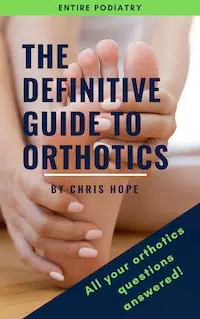What is Dorsal Midfoot Interosseous Compression Syndrome (DMICS)?
DMICS is a condition whereby the ligaments along the top of the midfoot are inflamed.
What does DMICS feel like?
The symptoms of DMICS usually include pain on either side of the foot and along the joint lines at the top of the foot (just in front of where the lower leg meets the
foot).
If you have DMICS you may find that the pain is worse when weight-bearing, and just before lifting your heel from the ground during walking. You may also notice that the pain is exacerbated by walking in bare feet or in shoes with low heels.
What causes DMICS?
DMICS is caused by chronic excessive interosseous compression forces through the joints in the top of the midfoot during weight-bearing activities.
Any factors that cause flattening of the arches of the feet can increase these compressive forces. For example, low heeled shoes, a tight Achilles tendon and increased body weight are all factors that can contribute to the development of DMICS. Tight calf muscles can also cause the foot to pronate (roll inward), which can further exacerbate the symptoms of DMICS.
DMICS can occur in all adult age groups, and is more common in females. There may be no history of trauma associated with DMICS.
What is the treatment for DMICS?
DMICS usually responds well to conservative treatment, especially if treatment is commenced early.
Icing and non-steroidal anti-inflammatory medication is often recommended initially to reduce local pain and inflammation. However, effective management requires underlying mechanical causes to be addressed. Depending on your individual circumstances and podiatry assessment, treatment may include:
- A muscle strengthening and stretching exercise program, to address muscle imbalances and reduce tension in the Achilles tendon
- Footwear adjustments such as a heel raise or prescription of a slightly higher heeled shoe can help to prevent collapse of foot arches
- Longer term treatment and prevention is generally best achieved through the use of total contact orthotics which support the whole length of the foot. By preventing collapse of the arches, total contact orthotics can reduce interosseous compression forces through the top of the foot.
Are there any other treatment options for DMICS?
Cortisone injections are sometimes recommended for DMICS. However, a cortisone injection is often not adequate in terms of addressing underlying mechanical causes of DMICS. Surgical treatment options are available, however there are a range of possible complications associated with this type of surgery. Fortunately, conservative treatment is effective in most cases.




